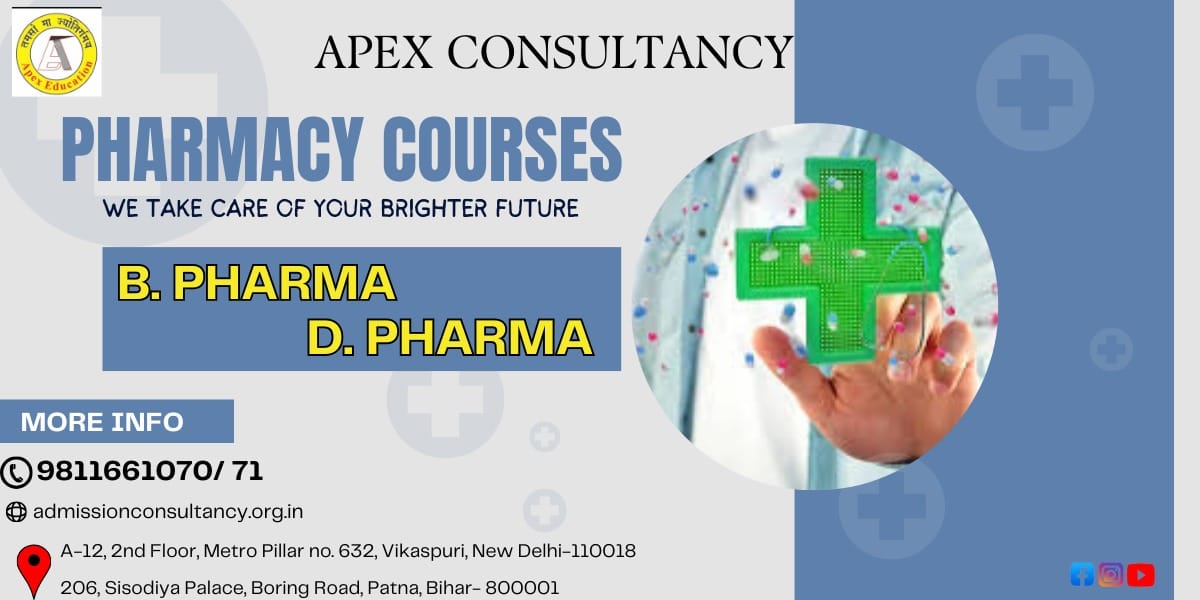Medicine Courses

Pharmacy Course Admission Information
Introduction
Pharmacy is a dynamic and essential field in the healthcare sector that focuses on drug formulation, dispensing, and patient care. It plays a crucial role in medical research, pharmaceutical industries, and clinical practices. Students aspiring to enter this field can pursue various pharmacy courses at diploma, undergraduate, postgraduate, and doctoral levels. Admission to pharmacy courses is based on entrance exams, merit, and counseling processes.
Types of Pharmacy Courses
Pharmacy education in India is offered through different programs designed to equip students with specialized knowledge in the field.
1. Diploma in Pharmacy (D. Pharma)
Duration: 2 years
Eligibility: 10+2 with Physics, Chemistry, and Biology/ Mathematics
Objective: Provides basic knowledge about pharmacy and prepares students for entry-level roles in retail and hospital pharmacies.
2. Bachelor of Pharmacy (B. Pharma)
Duration: 4 years
Eligibility: 10+2 with Physics, Chemistry, and Biology/ Mathematics
Objective: Focuses on pharmaceutical sciences, drug development, and patient care.
Lateral Entry: Candidates with a D. Pharma qualification can get direct admission into the second year of B. Pharma.
3. Master of Pharmacy (M. Pharma)
Duration: 2 years
Eligibility: B. Pharma degree from a recognized institution
Objective: Specialization in fields like Pharmacology, Pharmaceutical Chemistry, Pharmaceutics, and Clinical Pharmacy.
4. Doctor of Pharmacy (Pharma. D)
Duration: 6 years (5 years of academic study + 1-year internship)
Eligibility: 10+2 with Physics, Chemistry, and Biology/ Mathematics OR B. Pharma graduates for lateral entry into the 4th year.
Objective: Focuses on clinical practice and prepares students for patient-centered roles in hospitals and healthcare institutions.
5. Ph.D. in Pharmacy
Duration: 3-6 years
Eligibility: M. Pharm degree from a recognized university
Objective: Research-based degree aimed at developing new drugs and pharmaceutical formulations.
Eligibility Criteria for Pharmacy Courses
The eligibility criteria for different pharmacy courses vary depending on the level of education and specialization.
1. Eligibility for D. Pharm
Academic Qualification: Candidates must have completed 10+2 with Physics, Chemistry, and Biology/Mathematics from a recognized board.
Minimum Marks: 40%-50% (varies by institution).
Age Limit: Minimum 17 years.
2. Eligibility for B. Pharm
Academic Qualification: Candidates must have completed 10+2 with Physics, Chemistry, and Biology/Mathematics.
Minimum Marks: 50% (45% for reserved categories).
Entrance Exam: Some universities conduct their own entrance exams, while others admit students based on merit.
3. Eligibility for M. Pharm
Academic Qualification: B. Pharm degree from a recognized institution.
Minimum Marks: 50%-60% in B. Pharm (varies by institution).
Entrance Exam: Graduate Pharmacy Aptitude Test (GPAT) is widely accepted for M. Pharm admissions.
4. Eligibility for Pharm. D
Academic Qualification: 10+2 with Physics, Chemistry, and Biology/Mathematics OR a B. Pharm degree for lateral entry.
Minimum Marks: 50% in 10+2.
Entrance Exam: Some institutions conduct separate entrance tests, while others accept merit-based admissions.
Pharmacy Course Admission Process
Admission to pharmacy courses in India is conducted through entrance exams and merit-based selection.
1. Entrance Exams for Pharmacy Courses
Several national, state, and university-level entrance exams are conducted for admission to pharmacy programs.
National-Level Entrance Exams
GPAT (Graduate Pharmacy Aptitude Test) – Conducted by NTA for M. Pharm admissions.
NEET (National Eligibility cum Entrance Test) – Some universities consider NEET scores for Pharm. D admissions.
State-Level Entrance Exams
MHT CET (Maharashtra Common Entrance Test) – For pharmacy colleges in Maharashtra.
WBJEE Pharmacy (West Bengal Joint Entrance Exam) – For pharmacy colleges in West Bengal.
KEAM (Kerala Engineering, Architecture, and Medical Entrance Exam) – For pharmacy colleges in Kerala.
University-Level Entrance Exams
BVP CET (Bharati Vidyapeeth Common Entrance Test)
Manipal Entrance Test (MET) – Conducted by Manipal University for pharmacy courses.
Jamia Hamdard Pharmacy Entrance Test – Conducted by Jamia Hamdard University.
2. Merit-Based Admission
Many private and government colleges admit students based on 10+2 marks without requiring an entrance exam.
Direct admission through management quota is available in some private universities.
3. Counseling and Seat Allotment
After clearing the entrance exam, candidates participate in counseling sessions where they select colleges based on their rank and preferences.
Top Pharmacy Colleges in India
Pharmacy education is offered by various reputed institutions across India.
1. Government Pharmacy Colleges
National Institute of Pharmaceutical Education and Research (NIPER), Mohali
Jamia Hamdard University, New Delhi
Institute of Chemical Technology (ICT), Mumbai
Panjab University, Chandigarh
Madras Medical College, Chennai
2. Private Pharmacy Colleges
Manipal College of Pharmaceutical Sciences, Manipal
Birla Institute of Technology & Science (BITS), Pilani
SRM Institute of Science and Technology, Chennai
Amity University, Noida
JSS College of Pharmacy, Mysore
Pharmacy Course Fees
The fees for pharmacy courses vary depending on the type of institution (government or private).
| Course | Government Colleges (Annual Fees) | Private Colleges (Annual Fees) |
|---|---|---|
| D. Pharm | ₹10,000 – ₹50,000 | ₹50,000 – ₹2 lakh |
| B. Pharm | ₹15,000 – ₹1 lakh | ₹1 lakh – ₹5 lakh |
| M. Pharm | ₹50,000 – ₹1.5 lakh | ₹1.5 lakh – ₹4 lakh |
| Pharm. D | ₹1 lakh – ₹3 lakh | ₹3 lakh – ₹8 lakh |
Career Opportunities After Pharmacy
A degree in pharmacy opens up multiple career paths in healthcare, research, and industry.
1. Community and Hospital Pharmacy
Work in hospitals, clinics, and retail pharmacies as a licensed pharmacist.
2. Pharmaceutical Industry
Jobs in drug manufacturing, quality control, and research & development (R&D).
3. Clinical Research and Drug Development
Work in clinical trials and pharmacovigilance.
4. Government and Regulatory Agencies
Work with FDA, CDSCO, and other regulatory bodies in drug regulation and policy-making.
5. Higher Education and Teaching
Pursue M. Pharm, Ph.D., and become a lecturer or professor.
Conclusion
Pharmacy is a promising and rewarding career that offers multiple opportunities in healthcare and industry. Admission to pharmacy courses requires fulfilling eligibility criteria and clearing entrance exams where applicable. Choosing the right institution, preparing well for entrance tests, and understanding career prospects are essential steps toward a successful pharmacy career.
